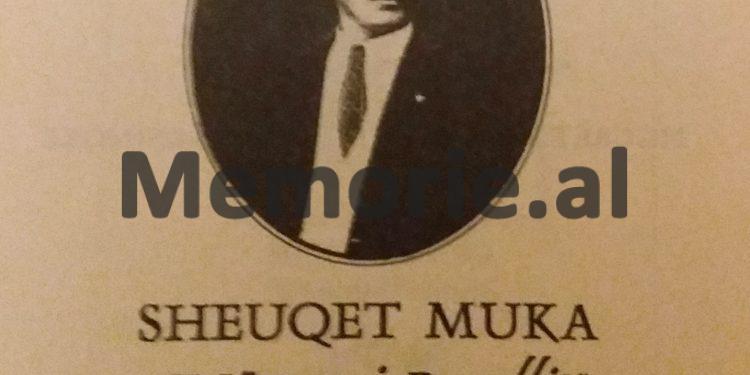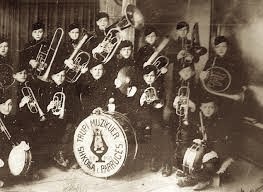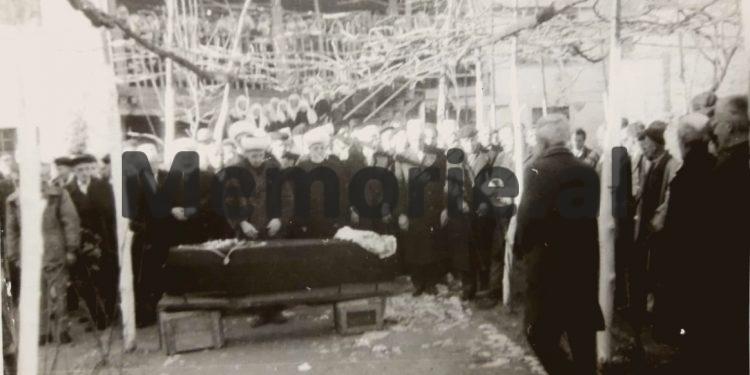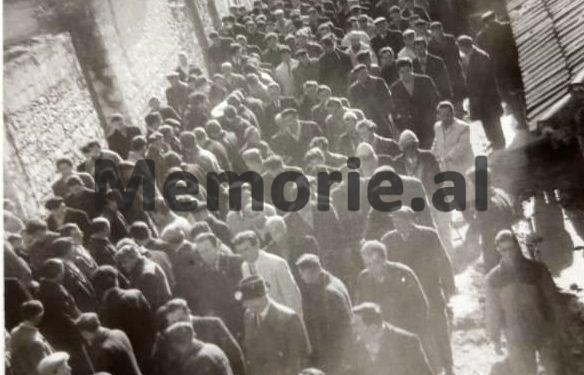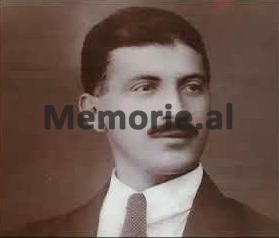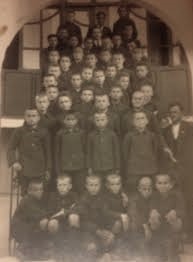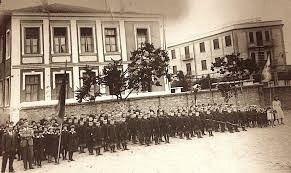By Sheuqet Kraja
Memorie.al/ Nearly fifty years have passed since we…. chained, we were found in one of the halls of the Great Prison, where we were subjected to a control as fierce as it was offensive. A group of hardened police officers tore and tore even the few clothes allowed by the regulation of the investigation cells. They slammed into the inner courtyard of the prison through a ditch. Each of us ended up in the default room. I did not understand why I was met in room no. 4, separated for special treatment. Maybe here I would meet the caretaker teacher, who was waiting for me on the threshold of a heavy iron door. It seemed that I needed more than others the warmth and sincerity of that heart, which raised me to the responsibility of a true parent. A warm handshake, accompanied by a particularly encouraging facial expression, introduced me to the vitally honored teacher, Mr. Sheuqet Muka. After a few days I was convinced that I was not the privileged one, but yes, I was the youngest. Dozens of other students of different ages were taught by him. The impression of the first night did not disappoint me.
My former teacher, full of intellectual-professional preparation, was distinguished by such moral, social and religious values that everyone rightly honored him. Perhaps this was the reason for the distinction given: “efendi”. Although I spent a long time with my Teacher, I find it difficult, very difficult
to point out the special, with which this fighter triumphed several times in the fields of the creepiest efforts and clashes that our national history saw with pain. For years, in front of, near and behind him, I failed to discover the heroism that made him gain the respect of place and honor alongside the rarest men Albanian’s. I yes, in every moment I felt the breath of the virtuous in every action, the softness of the heavenly light in thought the sweetness of the word always in the service of slain hearts. Preka, I lived the totality of moral, social, religious qualities, which embodied the generosity of this rare missionary, swayed and raised by the norms of the Islamic faith. Educated with the determination to extend and strengthen equal relations throughout the Albanian fraternity everywhere scattered, he knew no imposed, divisive borders, created for reasons created by foreigners. In this regard he says: “… if we are the sons of Albanian, its wings… let us all fly together. To live brotherly in our Albanian space.”
This simple materialism about the common national law of the Albanian Brotherhood, elaborated jointly with the group of teaching colleagues, quickly turned into a strong social value, which fostered trust and understanding among the convicts, instilled certain hopes for the common future. The spirit of brotherhood, of national unity, so carefully prepared in the Shkodra prison, took on wide proportions. It strongly radiated the spiritual realm of the prisoners, arousing feelings of closeness and regional, religious and social brotherhood. The ‘Great Tower of Isolation’, intended for the burial of free Albanian democratic thought, was revived. Gained new breath from the great ideas of union, cultivated by this school created with the courage and perseverance of the will of Mr. Sheuqet Muka, strongly supported by the group of competent intellectuals in several types of sciences.
With this union of professional-intellectual forces, he had built the type of the first free school with special features and content from that contemporary state. As such, in this already well-known school, the ‘Prison School’, we will find the theoretical and methodological elements most chosen for efficiency, the most popular thoughts and practices of world pedagogy, fused with the conditions and extensive professional experience of this teacher, educator and organizer known in Albanian education. On this space of knowledge, of professional scientific preparation, he had built two or three variants of educational curricula, rightly discussed and approved by the group of teachers, a test that proves his creative abilities in this field. He openly stated that the aim of our school should be: The revival of love and the appreciation of social and religious morality, as well as the practical acquisition of genuine scientific theory.
From this intense work you can imagine him at a relatively young age, sitting in the work cabinet, in front of a selected library…! No, you are wrong. Our former teacher broken in age, with deep, unhealed wounds, left over from inhuman tortures with machete and salt. He worked sitting on a 35-38 cm wide pole. And when he lacked any data, he found it in his colleagues. These were not books, they were books themselves, so they locked them in this tower. While for the work cabinet they had assigned room no. 4, with a permanent overload of over 170 people, adding to this condition the feces of all these men, the stifling smell of bodies not washed since the sentence, parasites of any kind: bugs, flies, lice, mice, fleas and a collection of insect worms that were added from the dirty prison toilet.
All this would be somewhat accepted, as if at any moment the shadow of horror, of insecurity did not follow for the irresponsible explosions of the people of command, who at every moment were all-powerful to carry out the fight against the “enemies of the people”. In this environment and approximately in these conditions, honorable men like Mr. Sheuqet Muka, did not forget the duty, both to the fellow brothers and to the enslaved homeland. Neither repressive measures nor life imprisonment had weakened his willingness to organize and further develop his professional skills. He deepened every day the scientific research work for the construction of forms and teaching methods in the scientific definition of learning the role of education in the formation of the physiognomy of the individual and beyond. Evaluating and looking critically at the most authoritative views that enrich this discipline, he chose the most fruitful positive and with the power of an Albanian erudite tried to bring new theoretical and practical in Albanian pedagogy.
Thus, in these convictions, he argued in front of colleagues and convincingly stressed that the learning process is a complex inseparable from the elements of moral, religious and civic education. The absence of any component or the underestimation of any one, leads to the failure of our work. Thus, we will grow a wild tree, without fruit. Let us think of such a garden…, yes medet, the whole of Albania! Evaluating them as primary in function, he cultivated in the stages of every lesson, of every level. True, this pronounced, intentional requirement that possessed the teaching process, quickly managed to create the common physiognomy of the students of this school. Wherever it happened, even in the most difficult circumstances they stood out in every action. Educated with the moral, with a sense of responsibility of word and deed, of brotherhood, of social and religious understanding, they very quickly gained the love and respect of others.
This feature that rightly honored the Shkodra youth in labor camps, prisons, in re-sentences, etc., was the former fruit of the educational work led by the tireless teacher, Mr. Sheuqet Muka. With all these achievements, the headmaster and the teaching staff aimed at further deepening the popular character and the scientific purpose of the school. They elaborated on the idea of extending this activity to any prisoner, initially in room no.4. Our teacher writes: “Every life a learning bank”, where he simply gave the values and the need for knowledge and the opportunity to continue the lessons…! Each marked his own desire. Most of them came to the mountains to learn the ‘Kanun of Lekë Dukagjini’. Always creative our teacher programmed the subject. Thus, the contingent of students increased.
Tani, kraj z. Sejfi Vlamasi, Ranko Cerenkovi, Dionis Miçaaço, etc., worthy representatives of the Albanian intellectual thought are listed as uneducated teachers, such as: Kole Ndou, Vogël Ndoka, Zef Bala, and other men raised with the practice and experience of mountain assemblies. These, under the direction of Father Frano Kirit and John Mark Ndoit, created very attractive sessions, which were heard by others. This form of work greatly enlivened the desire and need for learning, so much so that I can boldly say that there was no life without an open notebook or book. We, mainly the “16-year-olds” still alive, are indebted to their generosity that with so much patience and pleasure the parent forgave us the light of their mind and their spiritual purity. They fulfilled what the monist state denied us. These were our teachers, our Fathers, who thought and worked so hard for us. Compiled texts and teaching methods. Completed the course materials: Language, Literature, History, Geography, Mathematics, Physics, Chemistry, Natural Sciences, Logic, Sociology, Psychology, Introduction to philosophy, civil law, Albanian law (Kanunet). Languages were taught in the prison school: Italian, French, English, Turkish, German, Arabic, Persian. These subjects programmed by our Teacher, in consultation with specialists and under their direction, gave the appearance of several departments, which acted separately from each other.
This kind of independence based on the subjects, based on the grouping of students in the rooms, of different levels, of other forced divisions helped a lot not to reveal this work so extended educational teaching. Seen from a pedagogical perspective, this was a ‘free school’, where the student chose the subjects he preferred. The preparation and individual progress greatly stimulated the creative work, created the possibility for the student to turn into a teacher for the lower levels. Thus, after a few years, the task of teaching was performed by highly prepared classmates. Teaching work based on individual or group, the right to choose subjects by each student, the right to choose the teacher, and often the text and method, were new pedagogical elements practiced in the Albanian school. This so favorable and fruitful solution by Mr. Sheuqet Muka, it was not a coincidence. It was the fruit of scientific knowledge so carefully accumulated by this erudite passionate in the teaching profession. In every circumstance and circumstance, he was a teacher. In every conversation he had, he communicated the new, the truth, the pure moral and religious.
Even in meetings with the family, he conveyed the sincerity and sweetness of a parent, love. In conversations with the students, he naturally gave space and scientific and religious light to the problems that came to them, while in the lesson he spoke to everyone on the basis of his knowledge. The comprehensive intellectual preparation he had acquired made him increasingly demanding of himself and his colleagues, our teacher was never satisfied with this title, he always remained a student of others. He listened to others, browsed others, discussed with others. Thus, the former permanent hotbed of philosophical discussions with a critical and analytical edge. In this roundtable, which was often attended by well-known personalities of Albanian thought, such as: Mr. Haxhi Ethemi, Pipa, Nepravishta, A. Kraja, P. Mushkalla etc., our teacher, said his word mainly about the problems of education. Discussing and posing about these issues made him more responsive. Always calm, away from any tendentious spirit, he evidenced the role and power of education in the family. In this view against many views, attitudes and practices known from antiquity, Sparta and later contemporary capitalist-communists defended with many inviolable arguments the primary and natural role of the family, accepting and defending it as the first unit where they are busy thread the social and moral elements.
He codified the role of the family with a series of sayings and attitudes of philosophers of all times, sanctifying it with many Qur’anic verses and prophetic praises. These tables so prosperous, laid out for young intellectuals and some eager students were very beneficial, but I, for subjective reasons, spared little from this great necessity. Rightly for the role of the family, of emancipation, of gender equality from the hand of our teacher came some modest translations and works, where with argumentative force he denounced the theorists of “weak sex”, of the condemned and inferior sex. Relying mainly on the Islamic worldview, he protected women from the most shameful discrimination they i. In his manuscripts he called on the progressive forces of society to protect women, the source of life and pure love. Save him from the dark exploitative goals prepared by well-known authors shumë many businessmen and politicians, failed rulers, who try to achieve profits and a range of other goals.
“These dark united forces prepare the ground for its moral-religious disintegration, luring and deceiving it with ‘liberties’ and ‘rights’ to make it more easily a commodity.” In this view he sought the emancipation of the man-ruler from the most abominable and harmful decays. He described the man as a restraining, oppressive force in the family. He said: “Communist, capitalist practices, ostensibly for the emancipation of women, are the most studied attempts to destroy and completely eradicate the educational role of the family. “This is the way to socialize or nationalize the last remaining private unit.” By locating this earthquake, he saw the danger of the Albanian family without economic basis, without the right to protection from society and religion, without financial means. Exactly for this Mr. Muka, protected the woman, because only this prolonged this educational unity. In the parallel assessment of some problems with social, ethical weight, he singled out civic religious education as a key component in the form of human oneness. Religious differences were not accepted by their nature, just as provincial quarrels, differences, gossip are the target of evil-minded people, careerists, the weapon of infidels…!
If we accept that genuine divine beliefs have an origin, they are the branches of a trunk. How can there be reasons for incompatible contradictions between them? In particular he spoke about this tangible phenomenon in our country, where two faiths meet in one family. Perhaps these beliefs made our teacher so close to any religious affiliation. He served everyone and everyone called him our Teacher. And it could not be otherwise. This suckling of that Shkodra family, well known for early national traditions and deep religious feelings, despite living and acting in special circumstances, he already revived even more those high qualities with which the great family of Mukejve.
For the preservation of these values, he advised me: “Beware, son, that always in isolated, uncultivated huts sprout and grow thorns and nettles, which for carelessness spread and very quickly become possessive”. Without touching and dealing with other problems, where the researcher wanted for the environment where he lived and worked, allow me, dear gentlemen, to take the opportunity and convince my Teacher, that everywhere I happened I did not forget the advice you often quoted: “Thank you the possible enemy, because you are twice honored, spiritually to God and morally before your enemy., “Do not practice the means that condemn you”, “Forgiveness and mercy are the qualities of God…”. With that sense of purity that he educated us, I pray for his soul: “O spirit of the Creation of the Universe! With Your Grace I rewarded the pious…/Memorie.al
Director of the Albanian School
Near the Albanian Cultural Center
Staten Island – New York




